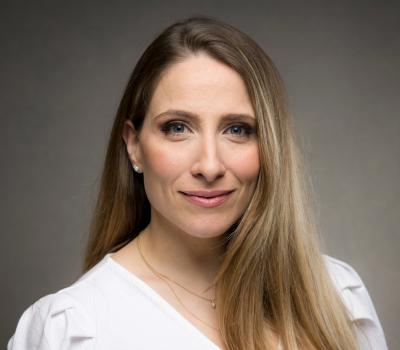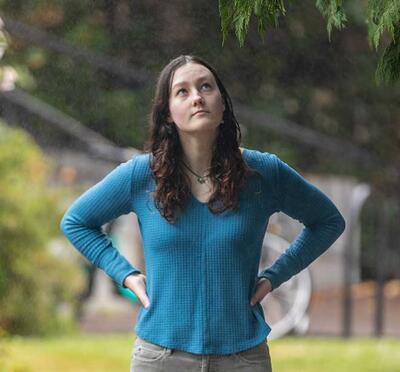In early April 2016, Caitlyn Clark, a graduate student in mechanical engineering, learned that she had won a fellowship sponsored by Avangrid, a U.S. subsidiary of Iberdrola, a multinational Spanish electric utility. What she didn’t know was that the queen of Spain would hand her the award.
“The people from Iberdrola kept asking me when I’d be available to get the award, but they didn’t tell me the date,” said Clark. “One day in June they called and said ‘Okay, we need you in Spain next week.’ I had no idea that I would even be going to Spain. I finally understood that Iberdrola had been working around the king and queen’s schedule.”
Clark arrived in Madrid on July 3, and two days later Queen Letizia Ortiz Rocasolano presented the award to her.
“They took pictures of me with the king and queen and Mr. Galán, the CEO of Iberdrola. It was all a brilliant surprise,” she said.
The fellowship allowed Clark to spend the past year pursuing original research through the Northwest National Marine Renewable Energy Center at Oregon State, using computational optimization and machine learning techniques to explore interactions between wave energy converters and offshore wind turbines.
She now awaits the start of another adventure, although there’s no mystery about when she leaves, and royalty is probably not in the plan. In August, she’ll set out for 10 months at Aalborg University in Denmark — a trip made possible by a prestigious Fulbright Scholarship. Once there, she’ll continue her research by focusing on the reliability of systems in which wave energy converters and wind turbines operate in the same ocean space.
“I’ll be trying to determine how to produce the most energy for the least possible cost,” said Clark. “Some of the people I’ll work with in Denmark literally wrote the book on the reliability of offshore renewable energy, so this is a wonderful opportunity to learn from top people in the field and develop relationships between them and NNMREC at Oregon State.” Clark hopes that her work will lead to informed decisions about the design of and investment in renewable energy systems.
Clark got her first taste of research during a high school internship with the Earthwatch Institute, during which she conducted biological studies at the boundary of the boreal forest and arctic tundra in Manitoba. It made a big impression on the Portland native.
“I loved science. I loved research, and I knew I wanted to do something in biology or ecology,” she said, “I figured that through engineering I might be able not only to learn about problems, but also create solutions for them.” That insight pointed her to the ecological engineering program at Oregon State, which she began in 2010.
As an undergraduate, Clark conducted original research at NNMREC’s Benthic Ecology Lab, studying the ecological effects of wave energy devices. She also traveled to Cork, Ireland, to research brown invasive algae in Europe’s first marine reserve.
After graduating in 2014 with her Honors Bachelor of Science degree in ecological engineering, Clark went to work for an environmental consulting agency in Portland. Her projects included wetland restoration and construction, and river engineering to restore water quality and natural habitats damaged by human activities.
She returned to Oregon State in 2015 to pursue an advanced degree in mechanical engineering. The discipline, she explained, offered the chance to make an impact in marine-based renewable energy. “These systems are essentially mechanical systems — moving parts creating energy,” she said. She was intrigued by the work of Bryony DuPont, an assistant professor of mechanical engineering who is now her advisor. DuPont’s research focuses on the development and application of computational design tools for renewable energy systems and sustainable product design.
Not surprisingly, Clark’s academic interest in the environment carries over to other activities. “I like snowshoeing, paddle boarding, hiking, and running — anything to get me outside,” she said. For much of her undergraduate time at Oregon State, Clark was a guide with Oregon State’s Adventure Leadership Institute. She is also passionate about empowering women.
“I think my own experience of growing up with strong female mentors fuels that,” she said. Since 2011, Clark has coached for Girls on the Run, a program that uses running to teach third- through fifth-grade girls about healthy choices, antibullying, and other positive messages.
“When they cross the finish line after a 5K and I see how joyful they are, that’s an amazing feeling, she said. “Those are some of my proudest moments.”




